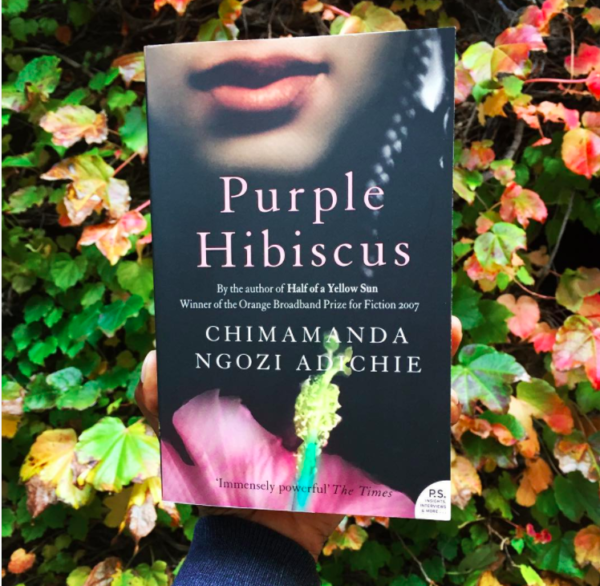
The last two decades of African writing have been exciting. So much of the little moments that led to the success of African literature in today’s very competitive literary scene still need to be told. That’s why we really appreciate Cassava Republic taking us way back—13 years ago—to Adichie’s first ever book event in Lagos.
In an article published on Cassava Republic’s website, we get a rare glimpse into the early days of Adichie’s literary career. Purple Hibiscus was published in 2003. But while the novel gradually got traction in the West, its author was still largely unknown in Nigeria. Besides, literature wasn’t yet a thing in Nigerian popular culture. But two entrepreneuring book lovers, Ebun Olatoye (now Feludu) and Yemisi Ogbe, fell in love with Adichie’s debut novel and pulled all the stops to introduce her to the emergent literati in Lagos.
The event took place in a restaurant called Yellow Chilli. Jeremy Weate anchored a live interview session with Adichie. And Fatai Rolling Dollar performed at the event. I wonder how many people seated in the audience that night could tell that they were sharing the evening with an author who would go on to define our literary moment in spectacular ways.
It’s fun going back and taking note of those little moments in the beginning when the greatness of our present moment was only just a vague outline. Today, Adiche is one of the most influential literary figures in the world. It’s nice to know that the Nigerian literary community had always believed in and rooted for her from the very beginning.
If you have similar stories to share, we would love to hear from you.
You can read the full story in a blogpost published on Cassava Republic’s website.
***
November 2003. We’d just moved to Lagos from London and were keen to get involved in cultural production (and escape the wasteland of living in VGC). Sensing kindred spirits, we volunteered to help Ebun Olatoye (now Feludu – pictured) and Yemisi Ogbe, then editor on how to improve Farafina magazine’s online presence and make it more financially viable. This was in the context of Jeremy’s experience in the new media sector in the UK. At our first meeting (a quiet Saturday in Onikan), we offered the best free advice we could give. Meanwhile, Ebun had brought copies of the novel of a new writer, Chimamanda Ngozi Adichie. Her excitement and desire to promote it in Nigeria was so infectious that we could not help but share in her enthusiasm. We got hold of a copy and devoured it in days. Purple Hibiscus drew us in: Nigeria had a new talent. We agreed with Ebun that Adichie must be widely known in Nigeria. Jeremy wrote the first review of Purple Hibiscus and had it published in the Guardian a few days later.
The rest of the Chimamanda Ngozi Adichie story is history (or herstory), if not quite a single story. It was inspiring to be a part of the early days, supporting the first tour from behind the scenes (Jeremy was pushed forward, reluctantly, to interview Chimamanda at the first book event, at Yellow Chilli restaurant). Ebun’s workload and passion for the project back then was awesome: we can’t forget the late nights she worked (and the vulnerable after-midnight drives home to Agege), the sheer hustle of the woman as she made one jigsaw piece click into place after another. She managed to get Fatai Rolling Dollar to perform his wonders that evening, re-introducing many of the guests to the music of their parents. The relatively shy and unknown Asa also performed that night, singing ‘Iwa El’ewa’ written by Ebun and Alaba Ajani. Rolling Dollar even took a shine to Ebun and had many of us rolling! Had Nigeria in recent times witnessed such a beautiful evening in a contemporary Nigerian culinary setting? Actors acting out parts of the book, beautiful music wafting in from outside. There was a sense of a new cultural moment everyone in the audience felt. That night and all the activities leading up to it placed both Farafina and Chimamanda in the minds of Nigerians. In our view, it was also what led to the birth of NLNG’s involvement in literature as Yemisi Ogbe drafted a proposal for Farafina to organise the NLNG event.
The energetic and fluid way Yemisi and Ebun worked together to put Farafina and Adichie on the map is a constant reminder of what women can do to support other women. Their role in the rebirth of Nigerian publishing will likely be lost in the forest; they will be women yet again written out of history. But we remember Yemisi and Ebun and their contribution to a new era in Nigerian publishing and writing, just as we remember all those indomitable women around the continent who continue to sweat quietly to ensure that our multifarious stories are kept alive and read: Colleen Higgs at Modjadji, Irene Staunton at Weaver Press, until not long ago Simi Dosekun and now Yona Oyegun-Masade at Kachifo, Afi Omoluabi at Parresia, Muthoni Garland at Storymoja, Melinda Ferguson at MF Books, Angela Wachuka at Kwani, the FEMRITE women and many more. They are all part of the exciting re-emergence of publishing across the continent.
Read the full post HERE.
**************
Image by yolanda_reads via Instragram.








Amatesiro Dore November 25, 2016 02:52
Hello Ainehi, "The Rebirth of Publishing in Nigeria" was written in response to my viral essay, "The Death of the Last Publishing House in Nigeria". I was working at Farafina Books at the time and my essay was published on the Farafina Blog. https://farafinabooks.wordpress.com/farafina-friday/the-death-of-the-last-publishing-house-in-nigeria/